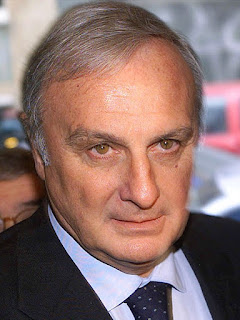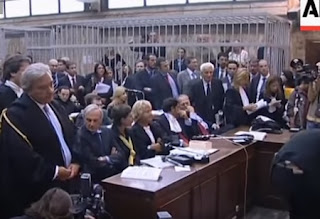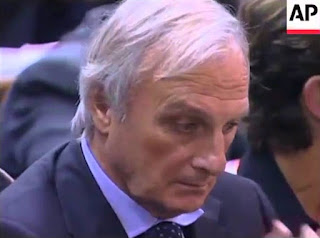Man at the centre of the Parmalat scandal
 |
| Calisto Tanzi took over his father's grocery store when he was 22 years old |
Tanzi was founder and chief executive of Parmalat, the enormous global food conglomerate that collapsed in 2003 with a staggering €14 billion worth of debt.
Subsequent criminal investigations found that Tanzi, who built the Parmalat empire from the grocery store his father had run in Collecchio, had been misappropriating funds and engaging in fraudulent practices for as much as a decade in order to maintain an appearance of success and prosperity when in fact the business was failing catastrophically.
Of all those hurt by the collapse, the biggest victims were more than 135,000 small investors who had bought bonds in the company, some of them trusting Parmalat with their entire life savings.
Between 2008 and 2010, Tanzi was found guilty by four different courts of fraud, of the fraudulent bankruptcy of Parmalat, the fraudulent bankruptcy of Parmatour, a travel industry subsidiary, and of false accounting at Parma, the football club he owned.
 |
| The Parmalat logo became familiar in almost every food store and supermarket across Italy and elsewhere |
The Parmalat story was portrayed as fairy tale of modern Italy. Calisto Tanzi was a 22-year-old university student when his father, Melchiorre, died suddenly in 1961. As the oldest son and out of a sense of duty to the family, Calisto gave up his studies in order to take over his father’s shop.
Family-run grocers were and still are a fixture in Italian high streets. Calisto could have had a comfortable life running such an essential business - but he had bigger ideas.
 |
| Parmalat was a major sponsor of sport, including football and Formula One motor racing |
The venture was a hue success and soon he diversified into pasta sauce, biscuits, yoghurts, fruit juice and ice cream. White lorries carrying the company’s simple petal logo became a familiar sight on Italy's roads.
Parmalat grew to become the entrepreneurial symbol of Parma, and Tanzi the city's most generous benefactor. The Tanzi family began to be seen as the Agnellis of Parma and Tanzi was determined to extend his largesse.
 |
| The court room at Tanzi's trial, in which he was found guilty of various frauds and jailed for 18 years |
Tanzi promoted the city's Verdi festival, in honour of the region's most famous composer, and paid for the uncovering and restoration of frescoes in the city's cathedral.
At its peak, Parmalat had more than 5,000 employees in Italy, and more than 30,000 in the rest of the world. Inside the company, however, things were not as they seemed.
Profits were hit hard by the collapse of Latin American economies during the 1990s, and the problems caused by that were compounded by the threatened bankruptcy of the family travel company, Parmatour.
 |
| Tanzi desperately wanted to maintain the appearance that his business was in good shape when it was actually failing |
It all came crashing down eventually over a sum of just €150 million needed to redeem bonds. One of the company's banks advised them to draw on the €3.95 billion that one subsidiary supposedly had sitting in a Bank of America account in the Cayman Islands. It soon became clear the account did not exist.
In late December 2003, Parmalat filed for bankruptcy protection. The US Securities and Exchange Commission then sued Parmalat, alleging it had wrongfully induced American investors to buy more than $1.5 billion worth of securities. Eventually, Tanzi and others were arrested.
As well as his prison sentence, Tanzi suffered the loss of many of his considerable collection of works of art as paintings by by Picasso, Monet, Degas, Van Gogh and others, worth more than €100 million, were seized by police, despite the efforts of friends to hide them, in order to pay back some of the company's losses. He was also stripped of the honours previously bestowed on him by the Italian government.
 |
| The headquarters of Parmalat is still in Collecchio |
There is evidence of a settlement in the area of Collecchio since the Paleolithic Age, although it was not until 1796 that it was given the status of a comune. Its history in the food industry began at the end of the 19th century as a centre for canning and meat products. It became an important centre in the Italian charcuterie industry as well as for dairy products including Parmesan cheese. It is still the headquarters of Parmalat, which was restructured in 2005 and is now a subsidiary of the French group Lactalis. In April 1945, the town was famously liberated from Nazi forces by the Brazilian Expeditionary Force in the Battle of Collecchio.
| The church of San Giovanni Evangelista in Parma with its beautiful facade |
Parma is an historic city in the Emilia-Romagna region, famous for its Prosciutto di Parma ham and Parmigiano Reggiano cheese, the true ‘parmesan’. In 1545 the city was given as a duchy to the illegitimate son of Pope Paul III, whose descendants ruled Parma until 1731. The composer, Verdi, was born near Parma at Bussetto and the city has a prestigious opera house, the Teatro Regio. Among the main sights is the 11th century Romanesque cathedral and adjoining baptistery, the church of San Giovanni Evangelista, which has a beautiful late Mannerist facade and bell tower, and the Palazzo della Pilotta, which houses the Academy of Fine Arts, the Palatine Library, the National Gallery and an archaeological museum.
More reading:
Nevio Scala - the football manager who brought success to Parma
The mysterious death of Enrico Mattei
Camillo Olivetti - founder of Italy's first typewriter factory
Also on this day:
1494: The death of Giovanni Pico della Mirandola
1503: The birth of the Florentine master painter Bronzino
1878: The attempted murder of Umberto I
Home